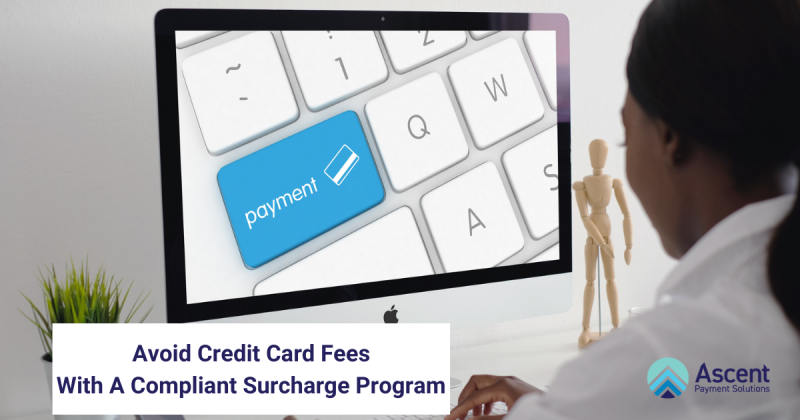
Avoid Credit Card Fees With A Compliant Surcharge Solution
AscentZeroCostPayment ProcessingGeneral
How Rental Managers Can Avoid Credit Card Fees with A Compliant Surcharge Program
Between the pandemic and credit card rewards, consumers have been trained to use their credit cards to pay for everything. Businesses feel pressure to accept card payments, but the processing fees can hurt their bottom line, especially smaller merchants. Payment processing fees, the biggest of which are assessed by the card brands and issuing banks, can be one of the top 3 highest monthly expenses for businesses.
Understandably, many merchants are looking to offset those high processing fees (or already are doing so) by passing them to their consumer.
Merchants that pass a processing fee to the consumer when paying with a credit card but add no fee when the consumer pays with a different form of payment (debit, ACH, check), are adding a surcharge.
The card brands don’t generally like surcharges because they view the fee as a disincentive for consumers to use their cards. For many years surcharging was banned. Now it is allowed, but there are strict rules and restrictions to follow for compliance.
Consequences of Non-Compliant Surcharging
In the vacation rental space, many of the popular software providers offer some surcharge capability but they might not be compliant with Visa, MasterCard, and Amex guidelines.
If your surcharge process is not compliant, the card brands can force you to stop surcharging.
Implementing a process that is not compliant with the card brand’s regulations can lead to significant penalties, which can be as bad as daily fines of up to $10,000.
Additionally, usually as a last resort, card brands can prevent merchants that don’t follow their rules from accepting ANY of their credit cards in the future.
Why take the risk?
How Can I Avoid the Fees AND the Penalties?
Use a compliant surcharge product!
As with most things in the world of payments, compliance can be tricky unless you partner with a trusted payments provider who can help you navigate the rules and offer products that comply with those rules.
Surcharge rules include:
- What card types are prohibited from surcharging and how to identify them at checkout
- Booking disclosure requirements
- Maximum surcharge allowed by state and how to automatically calculate it for every transaction – plus rules for how much you are allowed to surcharge (might be less than the max)
- States with regulations that prohibit merchants in those states from surcharging
- How to handle surcharge on refunds
- Authorization and receipt requirements
- Differences between brand-level surcharges and product-level surcharges
- Mandatory: registering your surcharge intent with the card brands
Wait. What IS Surcharging?
A surcharge is a small fee added to a credit card transaction that pays for the merchant’s cost of their discount fee. It’s a way to legally recoup most of the cost of accepting credit cards for bookings without passing the fee on to the property owner.
A surcharge is calculated as a percentage of the total amount due. But the surcharge rules state that you can never assess a surcharge that is higher than your merchant discount rate. Knowing how to calculate that rate can be challenging. Consult with your payment processor.
Currently 48 of the 50 states allow merchants to add some sort of surcharge to credit card transactions, with Connecticut and Massachusetts the only holdouts.
In recent years, new legislation and legal decisions governing credit card surcharges have made the practice more widespread, especially in certain industries.
In the vacation rental industry, many property managers add some sort of surcharge during the checkout process.
Do you know if you are surcharging? If you are charging the guest a fee on reservations paid by a credit card, but not on reservations where the guest pays with a different form of payment, you are surcharging.
If yes, do you know if it is a compliant solution? Consult a trusted payment processing expert to ensure you are not taking a risk on a non-compliant process.
Other considerations rental managers should consider when implementing a surcharge program:
- Competition
- Consumer attitude toward surcharges
How do I get set up with a compliant, quality surcharge product?
If you are interested in surcharging, look for a product that
- comes from a reputable, reliable processor with familiarity in your industry
- can distinguish between credit and debit cards at the point of sale
- can offer alternative payment methods instantaneously if a card user balks at the surcharge, so you don’t lose the sale
- uses an automatic surcharge calculation that doesn’t go over your discount rate though an integration between your software and payment gateway
- returns the correct percentage of surcharge on any related refunds
- covers the added cost of the surcharge, so that is truly zero cost on credit card payments
- ensures compliance with the different rules, regulations, and limits outlined by Visa, MasterCard, Amex, Discover, and all 50 states
As always, Ascent Payment Solutions is here to help you with your payment processing needs! If you would like to learn more about our compliant surcharge solution, AscentZeroCost, and how your software can integrate this service or you have questions about surcharge compliance in general, please contact us at 888-721-9301 or visit our website for more info.
Categories
Share This Content